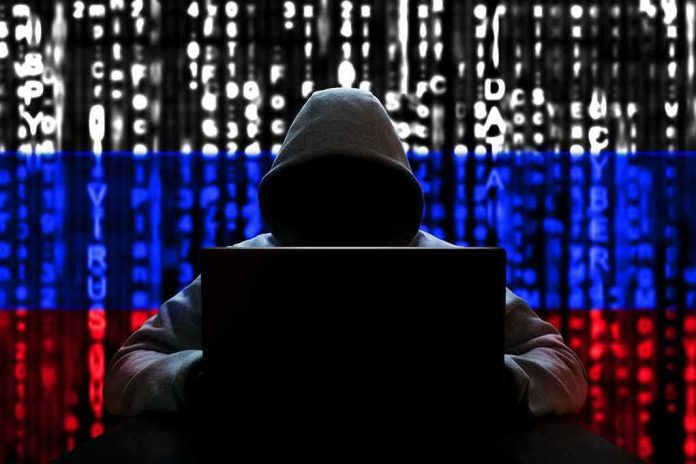
Russia’s latest crackdown on free speech plunges the country into new authoritarian depths, making it a crime to even search for so-called “extremist” content online—leaving every citizen’s curiosity under surveillance and punishable by law.
At a Glance
- New Russian law makes it a crime to search online for “extremist” content, not just share or create it.
- The law takes effect September 1, 2025, and includes VPN use in its crackdown.
- Fines target ordinary citizens, with warnings of harsher penalties to follow.
- International watchdogs unanimously condemn the move as a major assault on free expression.
Kremlin Outlaws Curiosity: Russia’s ‘Thought Police’ Go Digital
With the stroke of a pen, Vladimir Putin has done what even the most unhinged leftist censors in the West haven’t dared: criminalized the mere act of seeking information online. As of September 1, 2025, anyone in Russia who searches for “extremist” content—be it a banned blog, an opposition article, or even a post about LGBTQ+ rights—faces government fines, police scrutiny, and the chilling knowledge that Big Brother is watching their every click. The State Duma and Federation Council rammed this bill through in record time, targeting not just vocal dissidents, but anyone who dares to be curious about what the regime deems off-limits.
This law is not about stopping violence or terrorism. It’s about control—plain and simple. For years, Russians have endured escalating censorship: websites blocked, journalists jailed, social media throttled, all under the banner of “protecting society.” Now, the noose tightens further. The government’s official list of “extremist materials” swells past 5,000 entries, conveniently including political opposition, criticism of the government, and any advocacy the regime doesn’t like. Even searching with a VPN—a tool used worldwide to protect privacy—makes you a criminal. That’s not national security; that’s a digital iron curtain dropped on an entire country.
Fines for Curiosity, Pathway to Prison: The Chilling Effect on Ordinary Russians
Starting this fall, Russians who dare to search for “extremist” content may be slapped with fines between 3,000 and 5,000 rubles—up to $65 for a single search. But let’s not kid ourselves: fines are just the beginning. Human rights groups and digital freedom activists are sounding the alarm, warning that these “modest” penalties will open the floodgates for criminal charges, surveillance, and the routine harassment of independent journalists, researchers, and everyday citizens. The Committee to Protect Journalists calls it “the most serious step in censorship and the fight against dissent since 2022.” Human Rights Watch highlights the law’s broad, vague language, which allows police to punish anyone they want, for any reason, with zero oversight and no appeals. Even pro-Kremlin groups are worried they’ll get caught in the dragnet—when the censors start to eat their own, you know the regime has gone too far.
The law’s reach is as arbitrary as it is sweeping. The Ministry of Justice can update the “extremist materials” list at will, and the Federal Security Service gains new powers to monitor and investigate anyone, anywhere. Russia’s already-surveilled digital environment will now be weaponized against every citizen, with ISPs forced to store and share search histories with law enforcement. It’s not enough to avoid saying the wrong thing—now, even thinking about the wrong thing is a crime. The chilling effect is immediate: journalists, activists, and average people will self-censor out of fear, while researchers and students risk prosecution for seeking information in good faith.
International Outrage and the March Toward Total Control
This new law has prompted a rare moment of unity among international human rights organizations, tech industry advocates, and even some voices inside Russia’s own digital establishment. The verdict is unanimous: this is an unprecedented assault on free speech, privacy, and the basic right to seek information. The Committee to Protect Journalists, Human Rights Watch, and Deutsche Welle all warn of a future where no one in Russia can trust their own keyboard. Legal experts point out that the law’s fuzzy definitions enable selective enforcement—meaning the authorities can target political opponents, LGBTQ+ advocates, or anyone who falls out of favor with the regime.
Russia’s digital crackdown doesn’t just strangle free speech; it isolates the country technologically, driving up compliance costs for internet providers, blocking international research, and turning routine online activity into a minefield. There’s a reason so many authoritarian regimes love this playbook: when people are too afraid to search, speak, or organize, power becomes absolute. For Americans who value the Constitution, free inquiry, and the right to question authority, Russia’s descent into digital tyranny is a vivid warning of what happens when a government decides there’s no such thing as a private thought.
Judgment Day for Free Speech: What Comes Next?
For now, the fines may seem small, but experts agree that this is a trial balloon for far more draconian punishments. Once the government normalizes tracking and punishing searches, it’s a short step to criminal prosecutions, longer prison terms, and the systematic erasure of dissent. Russia’s regime, desperate to stamp out any flicker of opposition, has crossed a new line: criminalizing curiosity itself. Every American who cares about our freedom to read, research, and speak our minds should pay close attention. If history teaches us anything, it’s that when tyrants get away with this kind of madness, the dangers are never confined to one border.
The Kremlin claims it’s fighting extremism. In reality, it’s fighting the very idea that people have a right to think for themselves. If you think this kind of government overreach can’t happen here, think again. The lesson is clear—never let politicians, bureaucrats, or woke censors convince you that free speech is a privilege, not a right. Once you surrender curiosity, you surrender everything.
Sources:
Committee to Protect Journalists
Official Kremlin documentation




